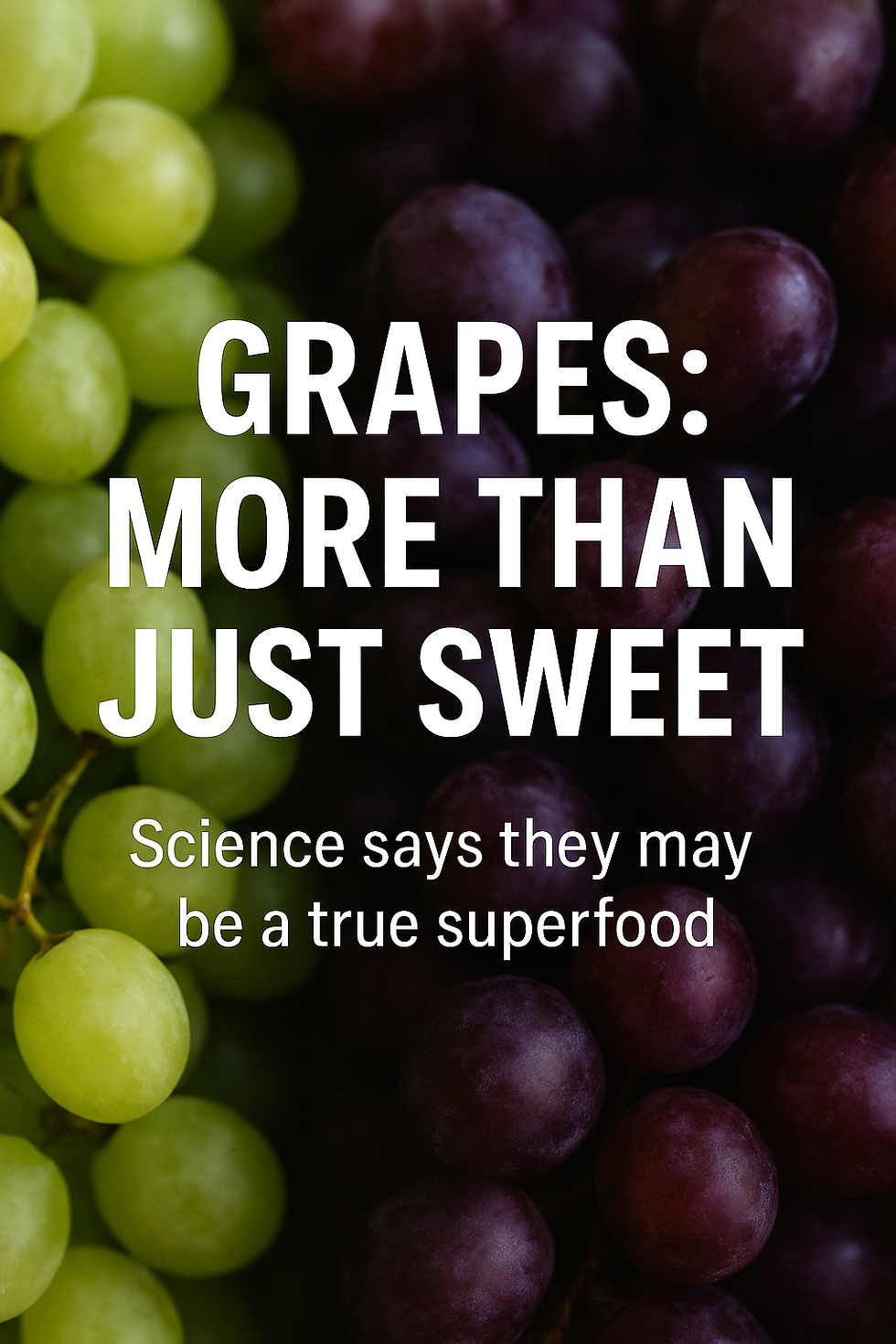Grapes: More Than Just Sweet - A Science-Backed Superfood?
- Aug 25, 2025
- 3 min read
For years, grapes have had a bit of a bad rap-dismissed for their sugar content and often nudged aside in favor of other “better” fruits. But thanks to fresh insights from a new study, grapes are stepping into the spotlight-and not just for their natural sweetness.
The Science Speaks

A recent article in the Journal of Agricultural and Food Chemistry by Professor John M. Pezzuto, a leading expert in resveratrol and nutrition science, brings grapes firmly into the “superfood” conversation.
Grapes naturally boast over 1,600 bioactive compounds, including powerful antioxidants and polyphenols such as flavonoids, anthocyanidins, catechins, phenolic acids, and resveratrol.
These compounds don’t act in isolation. The entire fruit—its “matrix”-works synergistically to promote cellular health, rather than any single ingredient.
Over 60 peer-reviewed studies (including clinical trials) show that grapes support:
Heart & Blood Vessel Health - improving circulation, relaxing blood vessels, and maintaining healthy cholesterol levels.
Brain & Cognitive Function - supporting metabolism and cognition.
Skin Protection - reducing DNA damage and increasing UV resistance.
Gut Health - enriching gut microbiome diversity and functioning.
Eye Health - enhancing macular pigment density.
At the genetic level, grapes influence gene expression-a field known as nutrigenomics-potentially underpinning their broad health benefits.
Dietitians and health experts emphasize that these findings are not hype. Grapes provide significant benefits-antioxidant protection, blood sugar regulation, blood pressure support through potassium, and even sleep and bone-health support via melatonin, vitamin C, K, calcium, and magnesium. Clinical results show that two servings per day (about 1.5 cups or ~250 g) are effective.
Purple grapes may even offer the most robust nutrition thanks to their anthocyanin content-yet overall, 1-2 cups a day can support cardiovascular, cognitive, and gut health.
What Nutrition Experts Say

The term “superfood” may be marketing-friendly, but scientists urge caution. Clinical dietitians stress that while grapes are nutritious, they’re not magical-but they do fit well into a varied, Mediterranean-style diet.
It’s also important to remember their sugar content. For people with diabetes or those watching blood sugar levels, grapes are best paired with protein or healthy fats to stabilize glucose response-and always eaten as part of a balanced plan.
In Summary: Why Grapes Deserve a Place in Your Diet
Benefit | Key Highlights |
Rich Nutrients | Over 1,600 beneficial compounds, including polyphenols and antioxidants |
Cardiovascular Health | Better blood flow, cholesterol, and vessel function |
Brain & Skin | Cognitive support and protection from UV/DNA damage |
Gut & Eye Health | Microbiome diversity and increased macular pigment |
Genetic Influence | Positive changes in gene expression |
Recommended Intake | ~1-2 cups (252 g) daily provides real benefits |
Practical Approach | Best enjoyed as part of a balanced and varied diet |
Healthy Grape Recipe: Yogurt Grape Parfait

Enjoy these benefits with a delicious, nutrient-dense parfait—perfect as breakfast, snack, or dessert.
Ingredients (serves 2)
1 cup (150 g) plain Greek yogurt (or plant-based alternative)
1 cup (150 g) mixed grapes (any color), halved
¼ cup (30 g) granola (whole-grain, low-sugar)
1 tbsp chopped nuts (e.g., almonds or walnuts)
1 tsp honey or maple syrup (optional)
Optional: fresh mint leaves for garnish
Instructions
In each serving glass or bowl, layer half the yogurt.
Add half the grapes, followed by half the granola and nuts.
Repeat the layers with remaining ingredients.
Drizzle lightly with honey or maple syrup if desired.
Garnish with mint, serve immediately, and enjoy!
Why it’s healthy:
Grapes: deliver polyphenols, antioxidants, fiber, and hydration.
Yogurt: offers protein and probiotics.
Nuts & granola: supply healthy fats and complex carbs.
Balanced flavors and textures make it satisfying and nourishing.



Comments